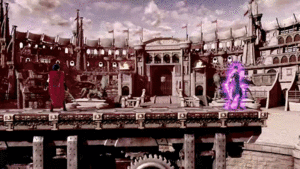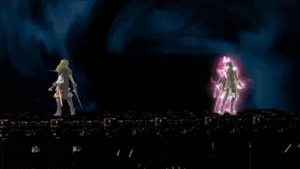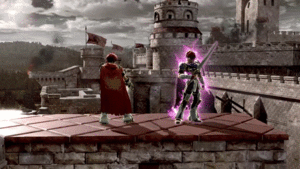| Critical Hit | |
|---|---|
Marth, Lucina, and Roy's Critical Hit in Ultimate. | |
| Users | Marth Lucina Roy |
| Universe | Fire Emblem |
| Article on Fire Emblem Wiki | Critical hit |
Critical Hit (必殺の一撃, Sure-Killing Blow) is Marth, Lucina, and Roy's Final Smash.
OverviewEdit
Marth and Lucina's versions of Critical Hit sees them rushing forward to deliver an immensely powerful slash that deals a devastating amount of knockback; in every game it appears in, it is also the most powerful attack of any character's standard moveset (in terms of knockback) without any exterior factors or buffs, and is an unavoidable one-hit KO if directly in the line of sight of a blast line, even on the largest possible stage of each game (with the exception of the Training stage in Ultimate).
Roy's version of Critical Hit involves him staying still and spinning the Binding Blade in a slow circle, before unleashing a fiery explosion in front of him. Unlike Marth and Lucina's Critical Hits, Roy's version is not a one-hit KO, though it is capable of comboing from some of his moves, including his throws.
For both versions of the move, a HP gauge from Fire Emblem is displayed alongside each hit character if the move hits, which starts at full and quickly drops to zero.
Instructional quotesEdit
| case foldout | Unleash a full-powered attack to launch foes. | |
| Move List | Marth dashes forward and strikes. If the attack connects, it has the potential to be a one-hit KO. Marth dashes forward a long distance, so there's a risk that you can self-destruct, but you can press the button again to stop. | |
| Lucina dashes forward and strikes. If the attack connects, it has the potential to be a one-hit KO. Lucina dashes forward a long distance, so there's a risk that you can self-destruct, but you can press the button again to stop. | ||
| Roy swings his blade around to catch enemies, and then brings the sword down to finish them off in a blast of fire. The initial swing not only hits opponents in front of Roy, but also those behind him. |
Marth and LucinaEdit
The user raises their sword in the air, where it catches the light and shimmers brightly, before dashing forward with blazing speed to catch any unfortunate opponents with an extremely powerful slash. In all installments, Marth does not say anything while performing this move (apart from a simple grunt).
In terms of knockback, it is by far the strongest Final Smash in Brawl, SSB4, and Ultimate, and its power and damage also make it one of the strongest attacks in all of the games that it appears in (without any exterior factors or buffs). It deals 62% damage in Brawl (60% base plus 2% fresh) and deals more than enough knockback to KO any character at 0% under most normal circumstances. However, the power of this move is somewhat hampered by its larger time frame in which to perform a dodge (the time during which the user raises their sword), making it deceptively predictable and avoidable. Landing the blow is the easiest against opponents suffering from ending lag or helplessness, or who are simply unaware, as all other players in range can completely dodge the move by air dodging, sidestepping, or simply moving away with good timing. In Brawl, Marth can also get a guaranteed Critical Hit if he forces his opponent into an aerial grab release, although this only works on some characters. In SSB4 and Ultimate, the startup slows down time by a slight amount, making the main attack harder to dodge.
Until the attack animation completely ends, the entire sword carries the move's hitbox, meaning that the attack can also hit anyone directly behind the user when they raise their sword. Because the attack itself gives such an high amount of freeze frames, it is also possible for a fighter to walk into the user's sword once it hits another opponent and still be given a OHKO, even after half a second. Critical Hit only hits once, so with proper timing, moves that provide armor can be used to survive it. Of course, this will not stop the target from taking the move's full damage.
On the ground, the initial dash will follow the platform's contours, and the move will end without the user swinging if they reach the edge. In the air, the user will travel at high speed directly forward. The dash can be canceled immediately by pressing an attack button, which also causes the user to swing their sword. The dash will automatically travel its maximum distance if uninterrupted, which is approximately the same distance as the width of the largest area available in Brawl's Stage Builder; missing with this attack on the ground on a walk-off stage, or in the air without any intervening terrain, usually results in a self-destruct unless the player manually cancels the user's dash. The distance the Final Smash grants allows it to be used as an extremely effective horizontal recovery move if needed, although this is situational.
In Brawl, this attack has such immense knockback that it is possible for the main victim to KO other opponents by simply knocking into them.
In Super Smash Bros. 4, Critical Hit can ignore all forms of armor. It was also given to Marth's clone Lucina, with identical functionality. When she performs the move, Lucina announces "Time to change fate!" (運命を変えます!, I will change fate!) instead of merely grunting.
RoyEdit
Roy's Critical Hit involves him standing in place while spinning the Binding Blade in a backwards arc around him with two hands. It then flashes with light (similar to the startup of Marth/Lucina's shared Critical Hit) before Roy swings his sword violently downwards, creating a massive fiery explosion in front of him. Roy will then sheathe his sword (which is interruptible); if he finishes the Final Smash in the air, he leaps a small distance upward, which does not count as a second jump. Similar to Marth's/Lucina's, a purely aesthetic health bar appears for every victim sent flying, showing them dropping from full health to zero. However, Roy's variant of Critical Hit is not able to pierce through super armor.
Unlike Marth/Lucina's shared versions of Critical Hit (which can KO at any percentage under normal circumstances), Roy's version only deals 40% and can only begin KOing at around 40%. It also requires careful positioning since Roy stands still, and the hitbox does not cover below Roy, making it possible to miss if the opponent is not directly in front of him. However, touching the Binding Blade during the move's startup (when Roy slowly circles his sword) traps victims within the swing with an active fire-damage hitbox, which leads directly into the final hit. This gives the move combo utility at low percents, as a forward/down throw or neutral attack can lead directly into a Critical Hit. As the swing starts from behind, it is easier to catch opponents behind Roy when compared to the front.
Overall, Roy's Critical Hit is more reliable at connecting up close and can be used as a niche combo finisher, though it possesses significantly lower range and lacks the extreme power of Marth/Lucina's respective Final Smashes.
TrophiesEdit
In Super Smash Bros. BrawlEdit
- Critical Hit
- Marth's Final Smash. He thrusts his sword skyward, then rushes to meet his targeted enemy with furious speed. The blow he strikes is so powerful that his foe is instantly launched off the screen. As in Fire Emblem, a window appears that shows the character's hit points dropping rapidly to zero--but this is just for effect. Smash Bros. does not use a hit-point system.
- : Super Smash Bros. Brawl
In Super Smash Bros. for Wii UEdit
- Critical Hit (Marth)
- Marth raises his Exalted Falchion to the sky and then rushes forward to deal an incredibly powerful blow, almost certainly KO'ing anyone and everyone who gets hit! When it's used in the air, he'll fly forward a certain distance. On the ground, however, he'll only dash to the edge of the platform he's standing on.
- Marth raises his Exalted Falchion to the sky, then rushes forwards to deal an incredibly powerful blow, almost certainly KOing anyone and everyone who gets hit! When used in the air, he'll fly forwards a set distance, but on the ground, he'll only dash up to the edge of the platform he's standing on.
- Critical Hit (Lucina)
- In Lucina's Final Smash, she raises her sword high before dashing swiftly forward to deliver a deadly blow to whomever she makes contact with first. Even if their damage is low, this strike is powerful enough to take out foes in a single hit. Just make sure you don't dash off the stage when you use it in midair!
- In Lucina's Final Smash, she raises her sword high, then dashes swiftly forwards to deliver a deadly blow to whoever stands in her way. Even if their damage is low, this strike is powerful enough to take them out in a single hit. Just be careful not to dash off the stage if you use it in mid-air!
- Critical Hit (Roy)
- For Roy's Final Smash, he traps enemies in a circular swing of the blade, brings it up behind him, and then, in a blast of fire, brings the blade down for a powerful finisher! The downward attack is powerful on its own but doesn't have much range, so make sure you're close enough to hit your enemies with the full combo and really seal their fate!
- For Roy's Final Smash, he traps enemies in a circular swing of the blade, brings it up behind him and then, in a blast of fire, brings the blade down for a powerful finisher! The downward attack is powerful on its own, but doesn't have much range, so make sure you're close enough to hit your enemies with the full combo and really seal their fate!
OriginEdit
Critical hits are a staple feature of many role-playing video games (including other series seen in Smash, such as Pokémon, EarthBound, Final Fantasy, Xenoblade Chronicles, and Dragon Quest). They are generally rare attacks that have a certain chance of occurrence, with the payoff usually being an increase to the amount of damage dealt, e.g. doubling the current amount. In Fire Emblem, critical hits inflict three times the damage that a normal strike would (with the exception of Genealogy of the Holy War and Thracia 776), and the odds of executing them are based on the unit's skill stat and on the properties of the weapon they wield. The Critical Hit Final Smashes reflect the source material's extreme power — often far more than enough to kill an enemy in a single hit — with their high damage output and, in particular, the extremely high knockback of Marth and Lucina's shared version.
Executing a critical hit in Fire Emblem is almost always accompanied with a distinctive, flashy attacking animation, and these animations form the basis of each of the Critical Hit Final Smashes. Marth and Lucina's shared version loosely resembles Marth's animation when performing a critical hit with Falchion, Mercurius or a rapier in Fire Emblem: Shadow Dragon and the Blade of Light. Roy's Critical Hit is a near-exact match for his attacking animation while wielding the Binding Blade in Fire Emblem: The Binding Blade, right down to the airborne version's recovery flip, performed in all cases in his game of origin when Roy sheaths the sword after striking; this animation is identical for all attacks he makes with the Binding Blade, although it only catches on fire, as it does in Smash, for critical hits and long-ranged attacks.
The gauges that appear with Critical Hit are a nod to the hit point health system used in Fire Emblem, and are designed to resemble the HP gauges used in specific games. In Brawl, Marth's gauge resembles that of Fire Emblem: Mystery of the Emblem, and contains 52 units of HP, matching the maximum possible amount of HP in Shadow Dragon and the Blade of Light and Mystery of the Emblem (though their remakes increased this to 60). From Smash 4 onward, the gauge used for all three characters is patterned after that of Fire Emblem Awakening and counts 80 units of HP, again matching the maximum possible HP in that game under ordinary circumstances.
In more recent games, units announce their critical hits (and special skills such as Aether) with a bright flash and by uttering a dramatic quotation. Lucina's utterance of "Time to change fate!" in her Final Smash is taken directly from this: in Awakening and subsequent games, the Japanese version of the line, 運命を変えます! ("I will change fate!") is one of her critical hit/special skill lines. The line is usually translated "I challenge my fate!" in English Fire Emblem localizations, but not in Smash.
GalleryEdit
Critical Hit in Brawl
Marth's Critical Hit in Super Smash Bros. for Wii U.
Lucina's Critical Hit while dashing in Super Smash Bros. for Nintendo 3DS.
Lucina's Critical Hit in Super Smash Bros. for Wii U.
Lucina using Critical Hit in Super Smash Bros. for Wii U.
Names in other languagesEdit
TriviaEdit
- Marth's Final Smash is able to outrun the cars on Big Blue. In fact, it is even faster than Sonic wearing a Bunny Hood (who can also outrun the cars on Big Blue). However, the attack's ending lag will probably cause Marth to SD using it.
- Marth and Lucina's shared Critical Hit carries a special flinchless hitbox during the dash that negates the effects of the Metal Box, Super Mushroom, Poison Mushroom, and Lightning. If the move is used on a permanent metal character fought in Classic Mode or Special Smash, the opponent will instantly be forced back into their non-metal selves before being KOed.
- The hitbox of Marth and Lucina's shared Critical Hit actually extends slightly beyond the tip of the sword; this can only be noticed by triggering the slash prematurely, as the slash will not automatically activate until the user collides with an opponent.
- Roy's Critical Hit actually does less damage and knockback than his fully charged Flare Blade.
- When Roy performs the Final Smash, his sheath appears during the attack but disappears when the attack is finished.
- Chrom is the only character derived from Marth to not utilize this Final Smash, though his Final Smash does resemble Marth and Lucina's Critical Hit with an extra attack after the initial dash.


